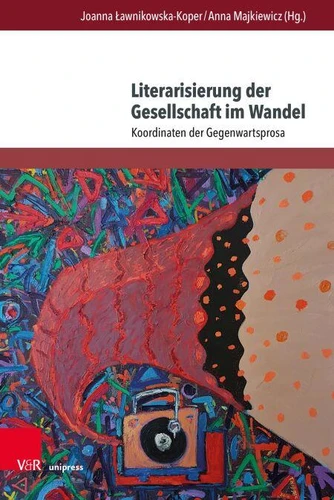Literarisierung der Gesellschaft im Wandel. Koordinaten der Gegenwartsprosa
Par : , , , ,Formats :
Disponible dans votre compte client Decitre ou Furet du Nord dès validation de votre commande. Le format PDF est :
- Compatible avec une lecture sur My Vivlio (smartphone, tablette, ordinateur)
- Compatible avec une lecture sur liseuses Vivlio
- Pour les liseuses autres que Vivlio, vous devez utiliser le logiciel Adobe Digital Edition. Non compatible avec la lecture sur les liseuses Kindle, Remarkable et Sony
 , qui est-ce ?
, qui est-ce ?Notre partenaire de plateforme de lecture numérique où vous retrouverez l'ensemble de vos ebooks gratuitement
Pour en savoir plus sur nos ebooks, consultez notre aide en ligne ici
- Nombre de pages302
- FormatPDF
- ISBN978-3-8470-1222-1
- EAN9783847012221
- Date de parution14/12/2020
- Protection num.pas de protection
- Taille9 Mo
- Infos supplémentairespdf
- ÉditeurV&R Unipress
Résumé
Die Beiträge des Bandes fokussieren das Thema Gesellschaftswandel aus unterschiedlichen Forschungsperspektiven. Die AutorInnen verweisen dabei auf Phänomene, Trends und Kontexte der gegenwärtigen Wandlungsprozesse (Erinnerungskulturen, Migration, Familie) und neue Modi ihrer literarischen Umsetzung. Die auf Paradigmenwechsel und narrative Sonderformen rekurrierende literatur- und kulturwissenschaftliche Reflexion prägt die Analysen der deutschsprachigen Gegenwartsromane von Lilly Axster, Sibylle Berg, Maxim Biller, Christine Fehér, Karen-Susan Fessel, Inger-Maria Mahlke, Anna Mitgutsch, Martin Pollack, Julya Rabinowich, Ilse Sarecka, Norbert Scheuer, Bettina Spoerri, Wolfgang Sréter, Otto F.
Walter und Natascha Wodin. Mit den Texten zu Szczepan Twardoch und Tomasz Lychowski integriert der Band auch die polnische Literatur. The contributions contained in this volume focus on the topic of a changing society from different research perspectives. The authors refer to the phenomena, trends and contexts of current processes of transition (cultures of remembrance, migration, family), as well as the new ways of their literary realisation.
Literary and cultural reflection, based on the paradigm shifts and special narrative forms, shape the analyses of contemporary German novels by such authors as Lilly Axster, Sibylle Berg, Maxima Billera, Christiane Feher, Karen-Susan Fersel, Inger-Maria Mahlke, Anna Mitgutsch, Martin Pollack, Julya Rabinowich, Ilse Sarecka, Norbert Scheuer, Bettina Spoerri, Wolfgang Sréter, Otto F. Walter and Natascha Wodin.
The volume also includes the Polish issues represented by the texts on Szczepan Twardoch and Tomasz Lychowski.
Walter und Natascha Wodin. Mit den Texten zu Szczepan Twardoch und Tomasz Lychowski integriert der Band auch die polnische Literatur. The contributions contained in this volume focus on the topic of a changing society from different research perspectives. The authors refer to the phenomena, trends and contexts of current processes of transition (cultures of remembrance, migration, family), as well as the new ways of their literary realisation.
Literary and cultural reflection, based on the paradigm shifts and special narrative forms, shape the analyses of contemporary German novels by such authors as Lilly Axster, Sibylle Berg, Maxima Billera, Christiane Feher, Karen-Susan Fersel, Inger-Maria Mahlke, Anna Mitgutsch, Martin Pollack, Julya Rabinowich, Ilse Sarecka, Norbert Scheuer, Bettina Spoerri, Wolfgang Sréter, Otto F. Walter and Natascha Wodin.
The volume also includes the Polish issues represented by the texts on Szczepan Twardoch and Tomasz Lychowski.
Die Beiträge des Bandes fokussieren das Thema Gesellschaftswandel aus unterschiedlichen Forschungsperspektiven. Die AutorInnen verweisen dabei auf Phänomene, Trends und Kontexte der gegenwärtigen Wandlungsprozesse (Erinnerungskulturen, Migration, Familie) und neue Modi ihrer literarischen Umsetzung. Die auf Paradigmenwechsel und narrative Sonderformen rekurrierende literatur- und kulturwissenschaftliche Reflexion prägt die Analysen der deutschsprachigen Gegenwartsromane von Lilly Axster, Sibylle Berg, Maxim Biller, Christine Fehér, Karen-Susan Fessel, Inger-Maria Mahlke, Anna Mitgutsch, Martin Pollack, Julya Rabinowich, Ilse Sarecka, Norbert Scheuer, Bettina Spoerri, Wolfgang Sréter, Otto F.
Walter und Natascha Wodin. Mit den Texten zu Szczepan Twardoch und Tomasz Lychowski integriert der Band auch die polnische Literatur. The contributions contained in this volume focus on the topic of a changing society from different research perspectives. The authors refer to the phenomena, trends and contexts of current processes of transition (cultures of remembrance, migration, family), as well as the new ways of their literary realisation.
Literary and cultural reflection, based on the paradigm shifts and special narrative forms, shape the analyses of contemporary German novels by such authors as Lilly Axster, Sibylle Berg, Maxima Billera, Christiane Feher, Karen-Susan Fersel, Inger-Maria Mahlke, Anna Mitgutsch, Martin Pollack, Julya Rabinowich, Ilse Sarecka, Norbert Scheuer, Bettina Spoerri, Wolfgang Sréter, Otto F. Walter and Natascha Wodin.
The volume also includes the Polish issues represented by the texts on Szczepan Twardoch and Tomasz Lychowski.
Walter und Natascha Wodin. Mit den Texten zu Szczepan Twardoch und Tomasz Lychowski integriert der Band auch die polnische Literatur. The contributions contained in this volume focus on the topic of a changing society from different research perspectives. The authors refer to the phenomena, trends and contexts of current processes of transition (cultures of remembrance, migration, family), as well as the new ways of their literary realisation.
Literary and cultural reflection, based on the paradigm shifts and special narrative forms, shape the analyses of contemporary German novels by such authors as Lilly Axster, Sibylle Berg, Maxima Billera, Christiane Feher, Karen-Susan Fersel, Inger-Maria Mahlke, Anna Mitgutsch, Martin Pollack, Julya Rabinowich, Ilse Sarecka, Norbert Scheuer, Bettina Spoerri, Wolfgang Sréter, Otto F. Walter and Natascha Wodin.
The volume also includes the Polish issues represented by the texts on Szczepan Twardoch and Tomasz Lychowski.



